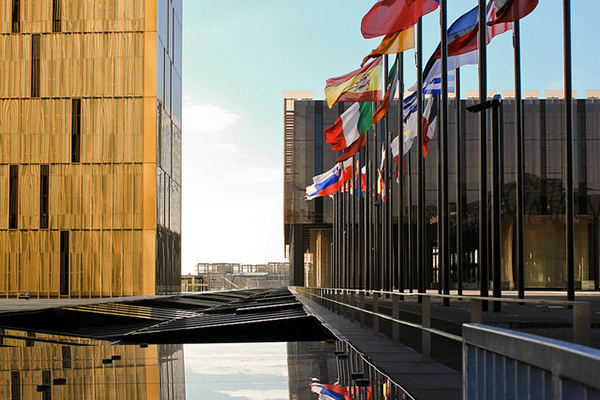
Europe –the EU and the Council of Europe– has enhanced the rule of law for both its citizens and member states. And it continues to do so. In recent weeks we have seen some examples of this enhanced rule-of-law provided by the EU, a system of which the European Arrest Warrant forms a part. Sometimes it comes to the aid of the member states themselves, not just their citizens. Last week the European Court of Justice of the EU (CJEU), based in Luxembourg, backed France by ruling that a state judiciary can prohibit and fine a company such as Uber for illegal activities, in this case UberPop. The CJEU took the view that this is a transport service where drivers work with vehicles without any kind of licence, not a collaborative platform, thereby ruling in favour of the French state.
In March, the Irish Supreme Court refused to extradite a Pole suspected of trafficking drugs to Poland because of doubts about the integrity and independence of the Polish judicial system, exacerbating the crisis between Poland and the EU. The Irish court has turned to the CJEU for a resolution, arguing that ‘fundamental flaws’ in the Polish justice system –particularly in the alleged lack of independence in the Polish judiciary– have undermined ‘the mutual trust’ underpinning the European Arrest Warrant system.
Indeed, the setbacks in democracy and the rule of law in Poland and Hungary constitute one of the major issues on the EU agenda, something upon which the member states and the European Parliament –which has instigated sanction proceedings– and now the CJEU too will have to decide. European pressure has succeeded in forcing the Polish parliament to amend its authoritarian reforms of the judiciary. In the case of Hungary, the issue may be hampered by the recent overwhelming electoral victory of Viktor Orbán, who looks determined to press ahead with his plans, including his so-called anti-Soros law designed to curb civil-society institutions. It remains to be seen whether the EU really has enough levers and will be capable of defending and bolstering the rule of law in one of its most uncooperative members.
The CJEU –one of the most fundamental of the seven institutions of the EU, which is a legal construction– has turned into a sort of supreme or constitutional court for the Union, its member states, companies and citizens. The German Constitutional Court in Karlsruhe has for example resorted to it to clarify doubts about the legality of the purchase of bonds by the European Central Bank. The CJEU does not always, however, settle cases clearly or in a way that satisfies the litigants.
It is more than likely that the application of the European Arrest Warrant to extradite Carles Puigdemont from Germany to Spain will end up being resolved not by the regional court (Oberlandesgericht) of the Land of Schleswig-Holstein –assuming it does not revise its decision to reject the charge of rebellion and the issue of violence (in the form of its German equivalent, high treason)– but by the CJEU with a preliminary sentence, settling the conflict between the regional German court and the Spanish Supreme Court.
The case of this European Arrest Warrant is complicated, and to a certain extent unprecedented; first, because the system does not cover all types of offences, but rather, in a semi-automatic way, a list of 32 offences that does not include rebellion or its counterparts. And it is also a question of equivalences, as well as the issue of misappropriation and the more profound one of trust in the judicial systems of the member countries, almost all of them in the EU. While not ruling out the possibility of it going to the German Constitutional Court, the CJEU, with more authority than the Schleswig-Holstein court, would have to clarify matters with a preliminary ruling, without judging the merits of the case itself, as the regional German court should also refrain from doing.
With the European Arrest Warrant system, the EU has not yet reached in judicial terms the recognition of equivalence of norms that prevails for example in the internal market. All in good time. This case –exacerbated by the ruling against Spain by the European Court of Human Rights for the inhuman treatment of the T4 terrorists in 2006– is putting many noses out of joint in Spanish political and media circles. The prime minister, Mariano Rajoy, conscious of the value of relations with Germany and that the issue has arisen between judiciaries rather than governments, has kept a low profile. The Spanish government won the diplomatic battle in Europe (and beyond) against Catalan separatism and its anti-constitutional methods, but there is still all to play for in the political and media debates in the European and international realm, even more so following Puigdemont’s arrest in Germany.
If this case turns a large sector of Spanish politics against Europe, while another part continues being anti-EU on the grounds of austerity policies, Spain will lose out. The electorate of this country is much more pro-European than that of France; this is evident from a survey conducted by the Asociación Diálogo and the Elcano Royal Instituteshowing that 62% of Spaniards, compared to 40% of French people, view membership of the EU as positive. But if as a result of the Catalan drive for independence –which is contaminating everything– Spanish enthusiasm for Europe should turn sour, Spain would not only lose influence in the EU but the country’s centrifugal tendencies would increase. Care needs to be taken with attitudes towards a Europe that, while it may not always be to everyone’s liking, strengthens the rule of law.


